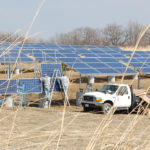A single Catholic in his 20s in our diocese whose frustration with his job has its roots in loneliness, reached out on social media asking for help. “I need community,” he later told his loved ones. Loneliness is part of the human condition but its pervasiveness in today’s culture compelled the U.S. Surgeon General Dr. Vivek H. Murthy to issue an advisory last month. “Our Epidemic of Loneliness and Isolation: The U.S. Surgeon General’s Advisory on the Healing Effects of Social Connection and Community” lays out the crisis and remedies.
Social isolation and loneliness have an impact both on individuals and communities. The U.S. Surgeon General’s advisory states, “synthesis of data … shows poor social relationships (social isolation, poor social support, loneliness) were associated with a 29% increase in the risk of heart disease and a 32% increase in the risk of stroke. Interestingly, these effects can begin early in life and stretch over a lifetime. Research has also found that childhood social isolation is associated with increased cardiovascular risk factors such as obesity, high blood pressure, and blood glucose levels in adulthood.”
Dr. Henry Emerle, a psychiatrist in Davenport and member of Our Lady of Lourdes Parish in Bettendorf, can attest to some of the consequences. “Isolation is a risk factor for cognitive decline in ways we still do not fully understand,” he told The Catholic Messenger. “It is also a risk factor for depression and heart disease. It can actually shorten our lives in addition to reducing quality of life.” As the advisory found, “Chronic loneliness and social isolation can increase the risk of developing dementia by approximately 50% in older adults, even after controlling for demographics and health status.”
Among other insights in the advisory that speak to us as people of faith: “Religious or faith-based groups can be a source for regular social contact, serve as a community of support, provide meaning and purpose, create a sense of belonging around shared values and beliefs, and are associated with reduced risk-taking behaviors.” However, the percentage of Americans who belong to a church, synagogue or mosque has been on the decline for decades.
We can reverse this trend by committing to building a more welcoming Church in which people feel a greater sense of belonging. A diocesan Synodal Summit on June 17 will provide the tools for parish and school representatives to lead us in a yearlong effort in that endeavor. This emphasis on welcoming and belonging requires us individually and collectively to reflect on and perhaps change the attitudes, behaviors and tendencies that cause us to separate ourselves from other people.
The advisory includes a “National Strategy to Advance Social Connection” that identifies six foundational pillars, two of which we ought to adapt within our diocesan Church: deepen our knowledge (Pillar 5) and build a culture of connection (Pillar 6). Our call to action:
- Pillar 5: “Public understanding of the essential role of social connection in health and well-being is critical” to deepening our knowledge. We need to better understand the “drivers and solutions of connection and disconnection” within our faith communities as well as in the secular sphere. Start by reading the U.S. Surgeon General’s advisory (https://tinyurl.com/3k9zntch).
- Pillar 6: We build a culture of connection by focusing on the core values of kindness, respect, service, and commitment to one another. Each of us must regularly practice these values. As individuals and leaders, we do so through seeking out opportunities for dialogue in our parishes, schools and communities.
- Build diverse social networks. Our interaction with people from diverse backgrounds “can help to stimulate creative thinking and encourage the consideration of different perspectives, leading to better problem-solving and decision-making.”
- Small gestures matter. Smile at a passerby, have a conversation with someone after Mass or in the grocery store or coffee shop, in the hall at work or in the gym. These conversations “can foster a sense of interpersonal trust and create and maintain norms of reciprocity,” the advisory notes.
Hayley DeGreve, a young adult Catholic Quad-Citian and co-founder of “The Gray Matters Collective,” a mental health awareness movement, offers some additional ideas to address the loneliness epidemic:
- Find that person you normally wouldn’t talk to. Build a connection with someone you think is struggling and extend your hand to them. “We have to live in a more compassionate society,” DeGreve says.
- Take care of your own mental health. Doing so helps you in your relationship with others and with God.
Dr. Emerle builds on that advice. “To avoid isolation, make sure that serious mental health concerns like depression and anxiety that get in the way of socializing with others are being appropriately treated. Stay active in the activities you enjoy that promote social interaction — volunteering, sports, and games — anything that gets you with others.”
Finally, take time to reach out to someone who is hurting. Several people reached out to the young man who posted a cry for help on social media, spending time listening to and walking with him on the journey to social connection.
Barb Arland-Fye, Editor
(arland-fye@davenportdiocese.org)












